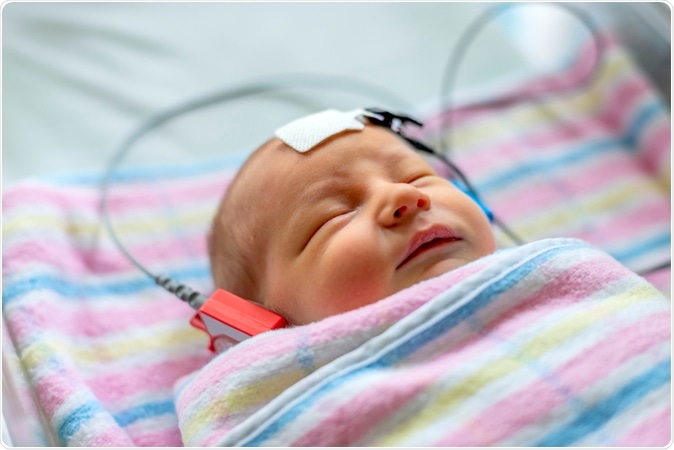Skip to:
Autism, or autism spectrum disorder, is a developmental disorder associated with a lack of social communication/interaction and restricted or repetitive behavior. The disorder is typically diagnosed within the first 2 years of life.

Emotion emoticons used by a psychologist during a therapy session with a child with an autism spectrum disorder. Image Credit: By Photographee.eu / Shutterstock
How does autism develop?
Although the exact etiology of autism is still unclear, it is believed that both genetic and environmental factors are responsible for the development of the disorder.
Certain risk factors are associated with autism. For instance, children born to older parents are at higher risk. Similarly, having siblings with autism increases the risk of developing the disorder. Other risk factors include preterm birth and low birth weight.
Moreover, children with certain genetic conditions, such as Down syndrome, fragile X syndrome, and Rett syndrome, are more susceptible to develop autism.
What are the early signs and symptoms of autism?
As mentioned in the Diagnostic and Statistical Manual of Mental Disorders, a child with autism generally presents with the following symptoms:
- Difficulty communicating or interacting socially
- Repetitive behavior
- Restricted interests
- Functional restriction in school, workplace, and other situations
The signs and symptoms of autism vary from person to person, and there is a wide variety of types and intensities of the symptoms.
The symptoms related to impaired social interaction/communication can include avoiding direct eye contact; being unwilling to listen to people; difficulty participating in conversation; having unusual vocal tone, facial expressions, and gesture; resistance to even small changes in daily routines; and difficulty understanding the feeling or actions of other people. Autistic children can show an intense reaction to sensory input, such as noise, light, temperature, etc.
Children with autism can show repetitive behaviors and restricted interests in things. They often tend to repeat words or phrases, which is medically known as echolalia.
Autistic children can have a considerable interest in certain topics, such as numbers or facts. They often have an in-depth learning ability and can remember things for a prolonged period of time.
How can autism be detected early?
The detection of autism is often challenging as there is no direct laboratory test for the condition. A diagnosis is generally made by analyzing the behavior and development of a child. Although the condition can be diagnosed in the early months of life, a reliable diagnosis is only possible at the age of 2 years.
The diagnosis is made in two phases: developmental screening and comprehensive diagnostic evaluation.
In developmental screening, a doctor takes short tests to analyze the child’s ability to learn the necessary skills. A doctor also checks if there is any delay in the learning process.
During the screening, a doctor may ask the parents about the social interaction patterns and behaviors of the child. Besides, a doctor can talk to or play with the child to understand his/her learning ability, speaking ability, behaviors, and movements. A delay in development in any of these areas can be a sign of autism.
For effective and timely detection of autism, all children should undergo screening for developmental delays during regular well-child doctor visits at the ages of 9, 18, and 24 or 30 months. Besides, all children should undergo specific autism screening tests at the ages of 18 and 24 months.
If any symptom of autism is detected during the developmental screening, a doctor may recommend a comprehensive diagnostic evaluation for further confirmation.
A comprehensive diagnostic evaluation performed by a team of specialized doctors, including developmental pediatricians (specialized in child development), child psychologists/psychiatrists (specialized in brain development and behavior), neurologists (specialized in detecting and treating neurological and neurodevelopmental disorders), and speech-language therapists (specialized in treating communication difficulties).
In addition to interviewing the parents, the team generally aims to evaluate the thinking ability, speaking ability, cognitive level, and age-matched basic skills (eating, dressing, and toilet habits) of the child.
Given the fact that autism can be associated with other medical conditions, a comprehensive diagnostic evaluation may also include vision and hearing testing, genetic testing, blood testing, and neurological testing.

Autism could be detected early using a hearing test finds research. Image Credit: Midkhat Izmaylov
The formal diagnosis of autism is made only after evaluating the results of all screening tests. According to the newly revised version of the Diagnostic and Statistical Manual of Mental Disorders (DSM 5), certain medical conditions (autistic disorder, Asperger’s’ syndrome, and pervasive developmental disorder not otherwise specified), which were previously recognized as separate conditions, are now grouped together as ‘autism spectrum disorder’.
References
Further Reading:Autism]
Last Updated: Mar 15, 2023